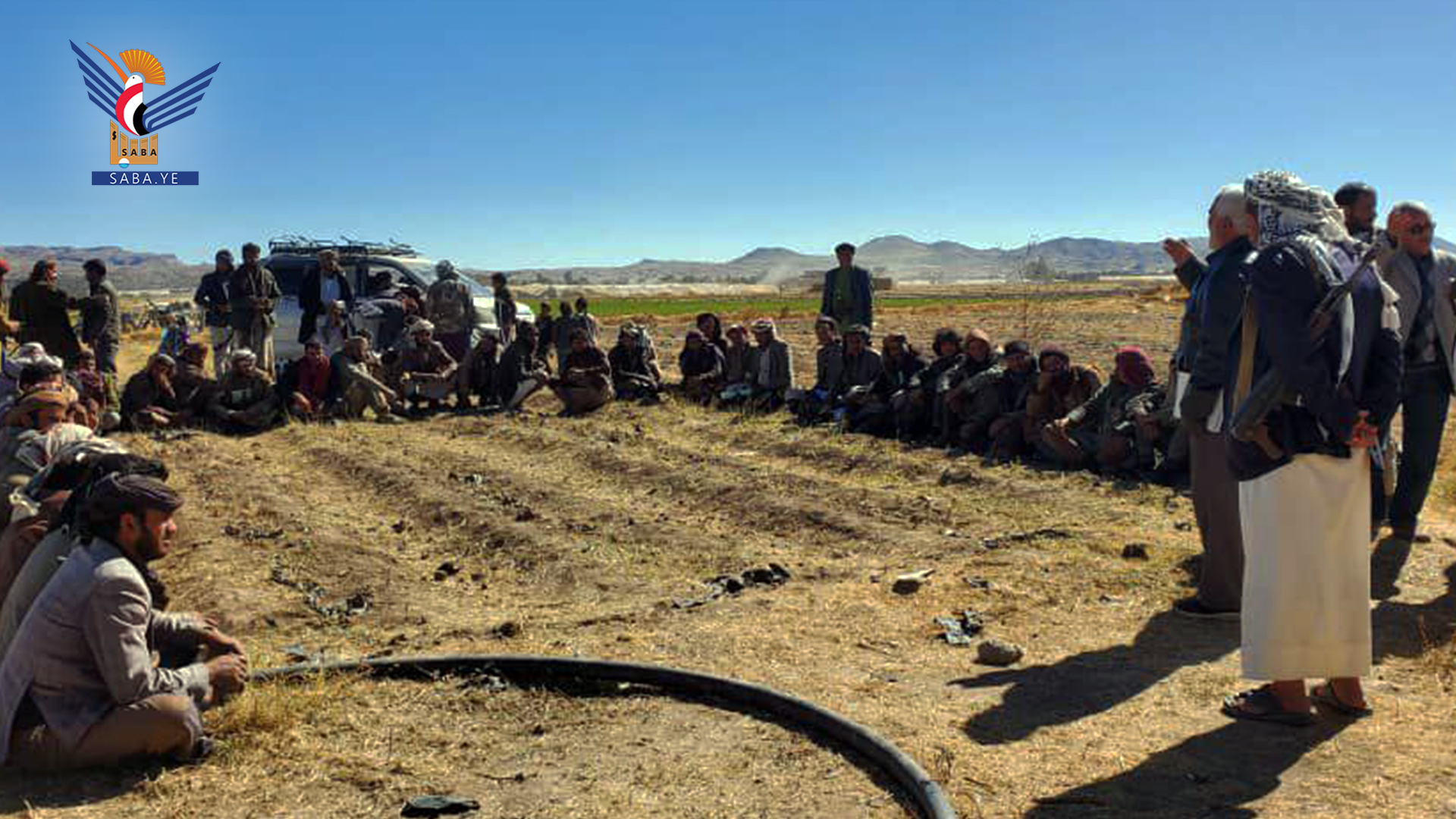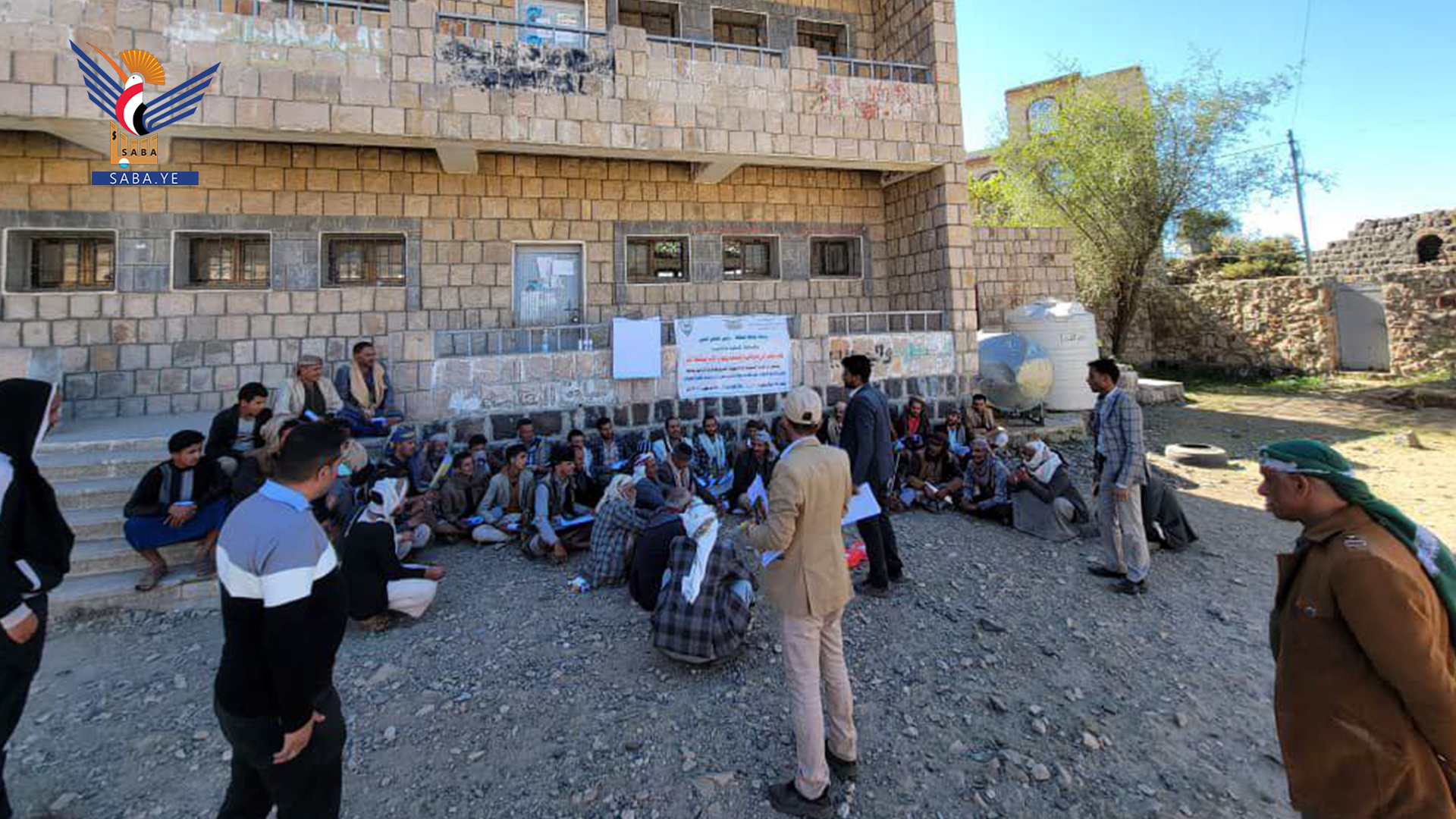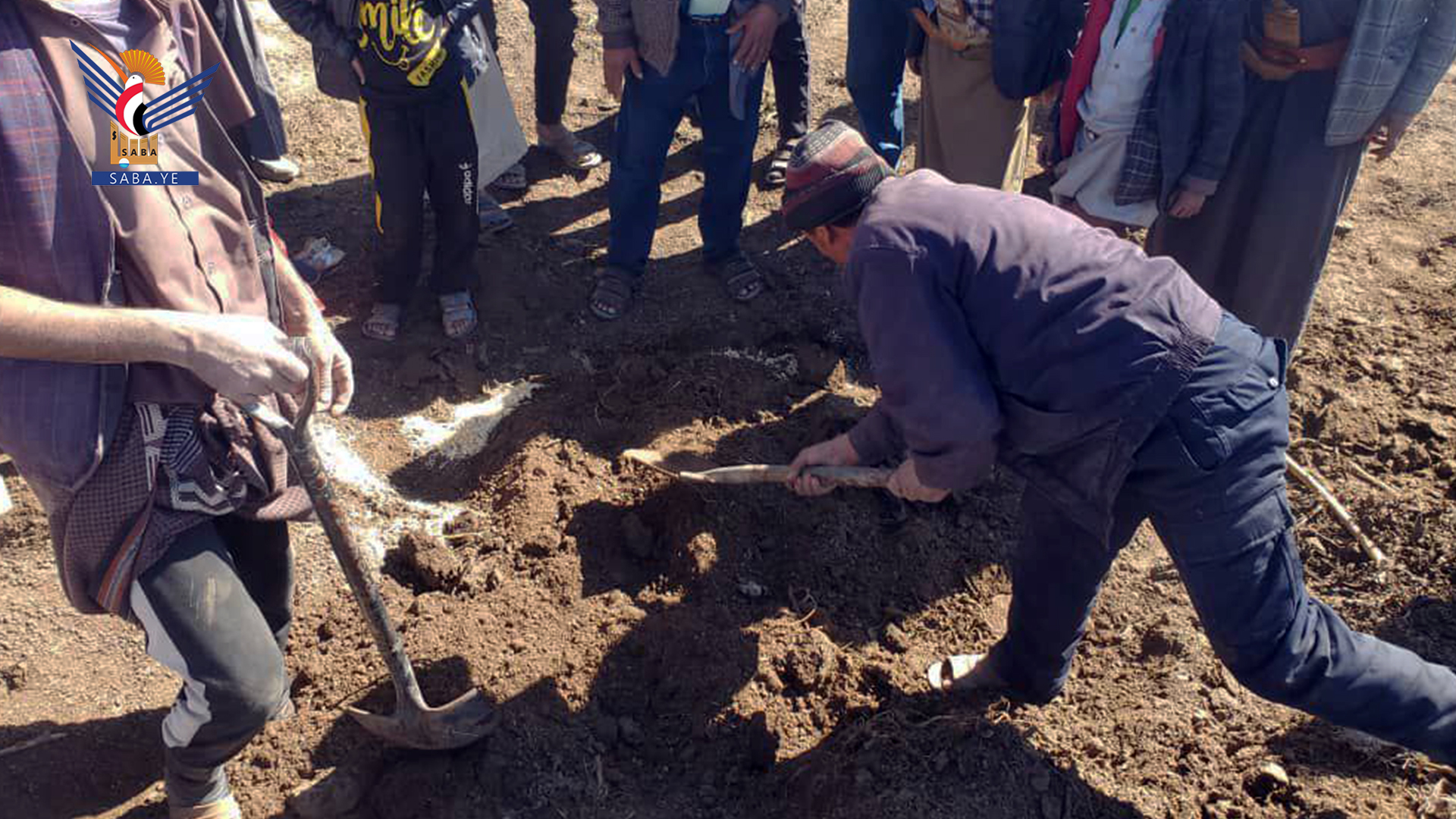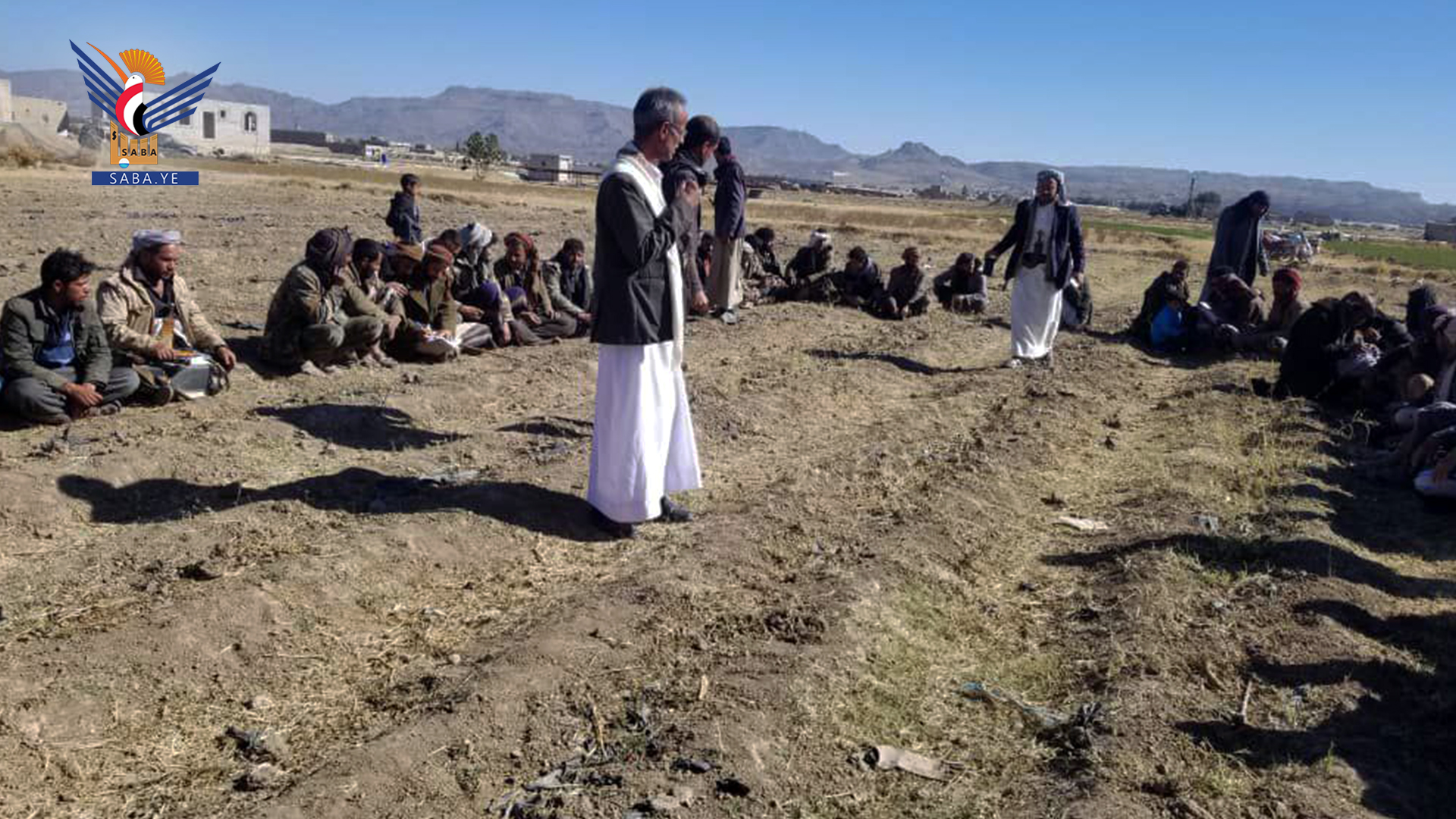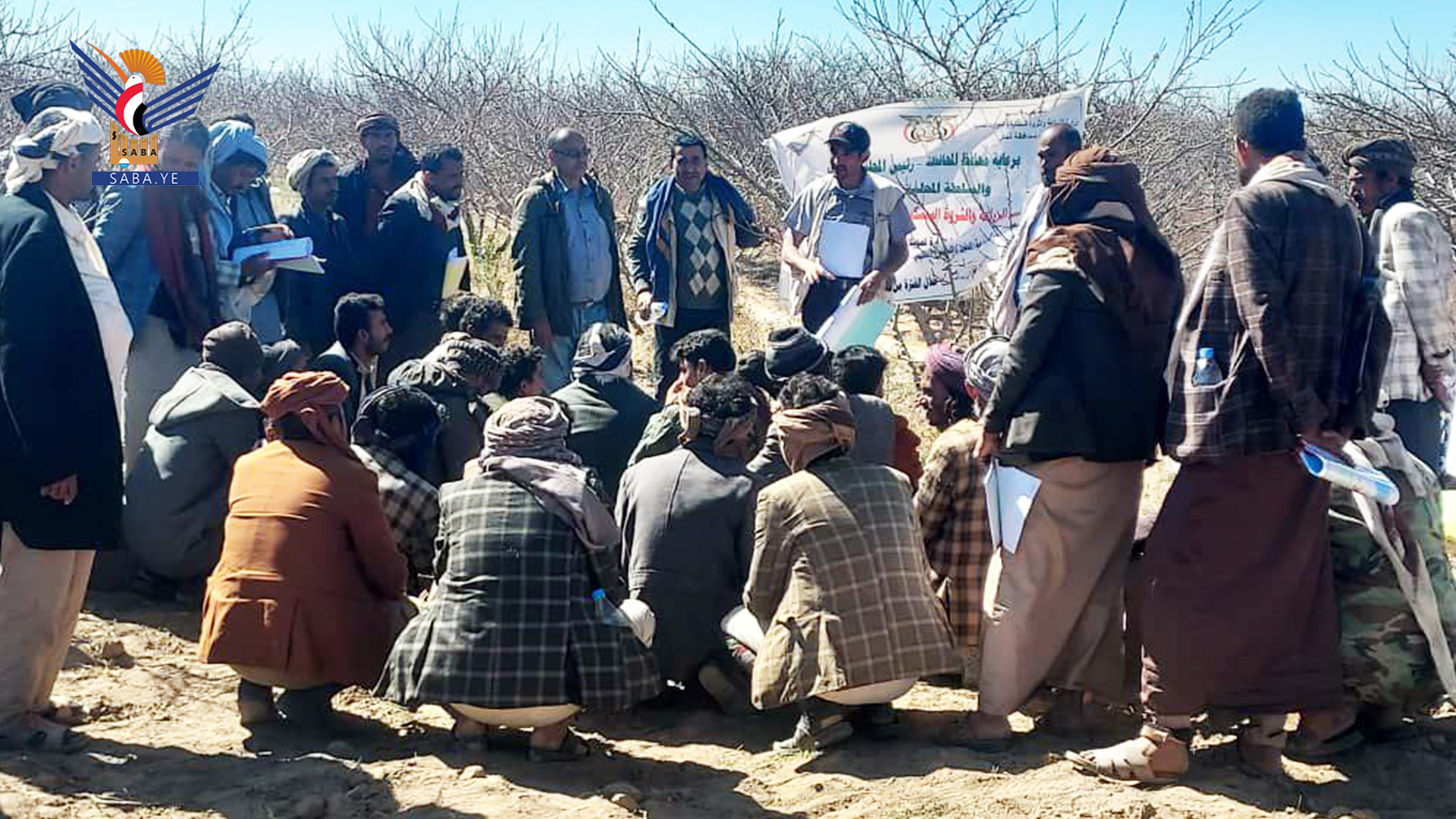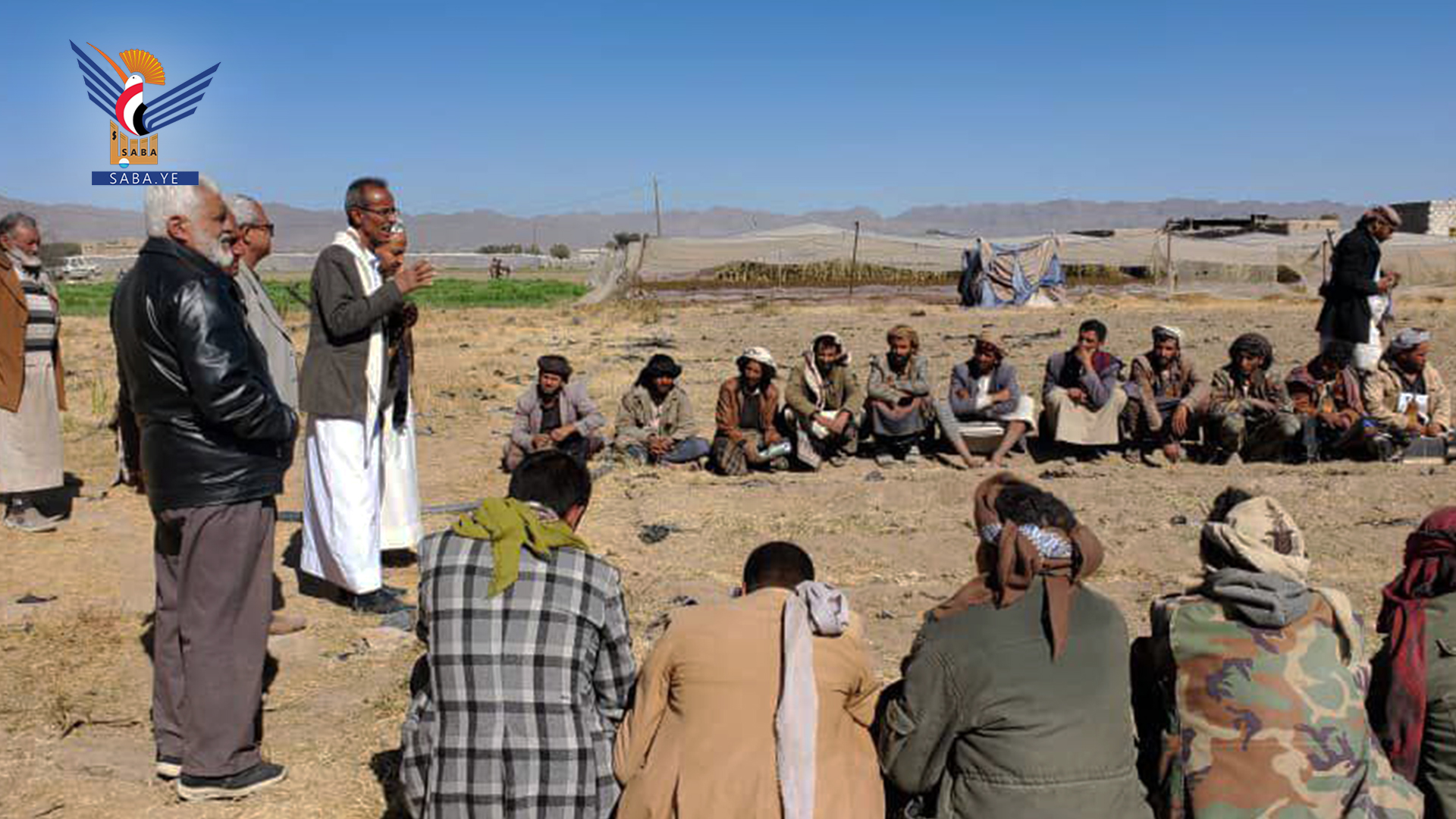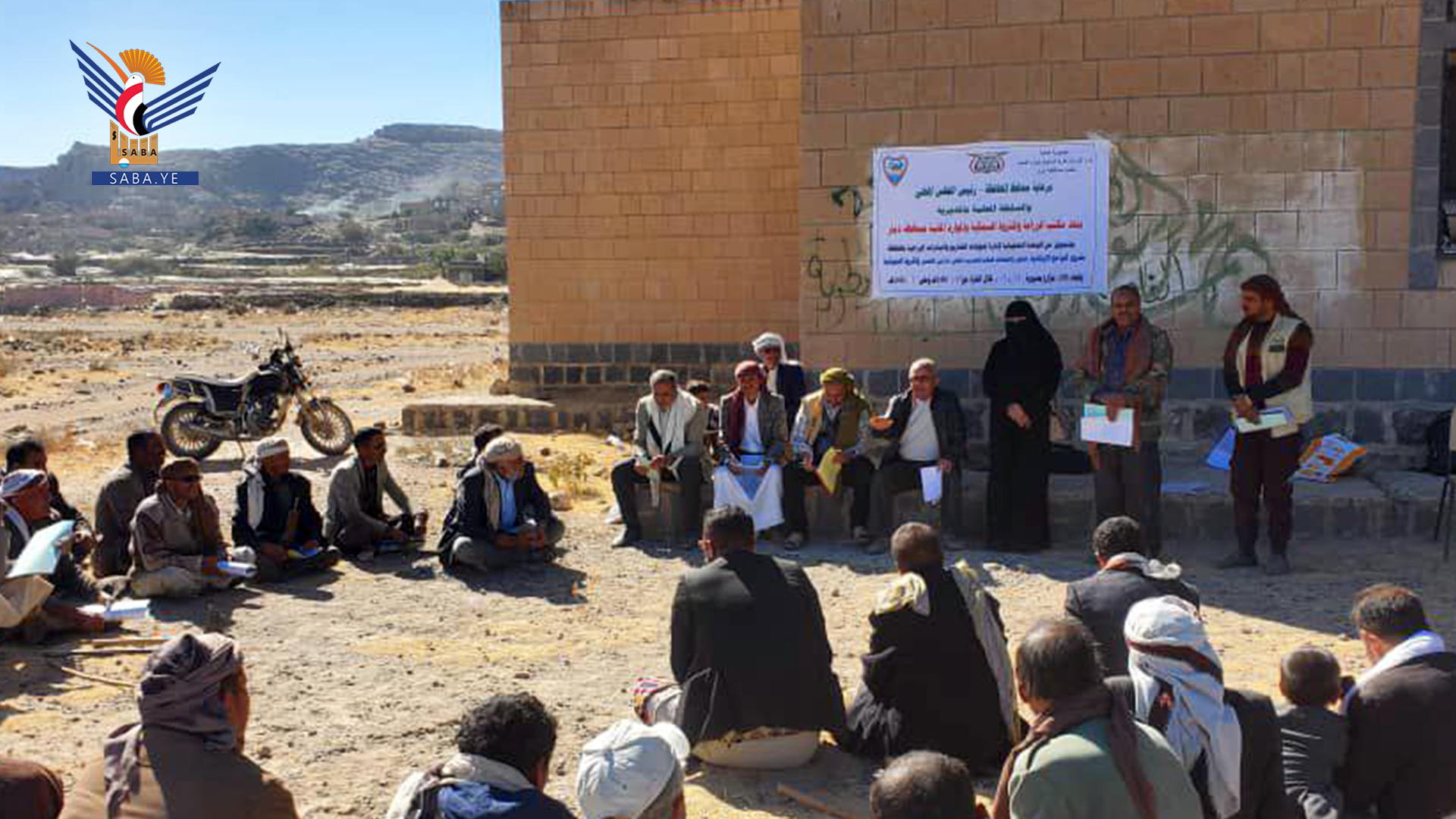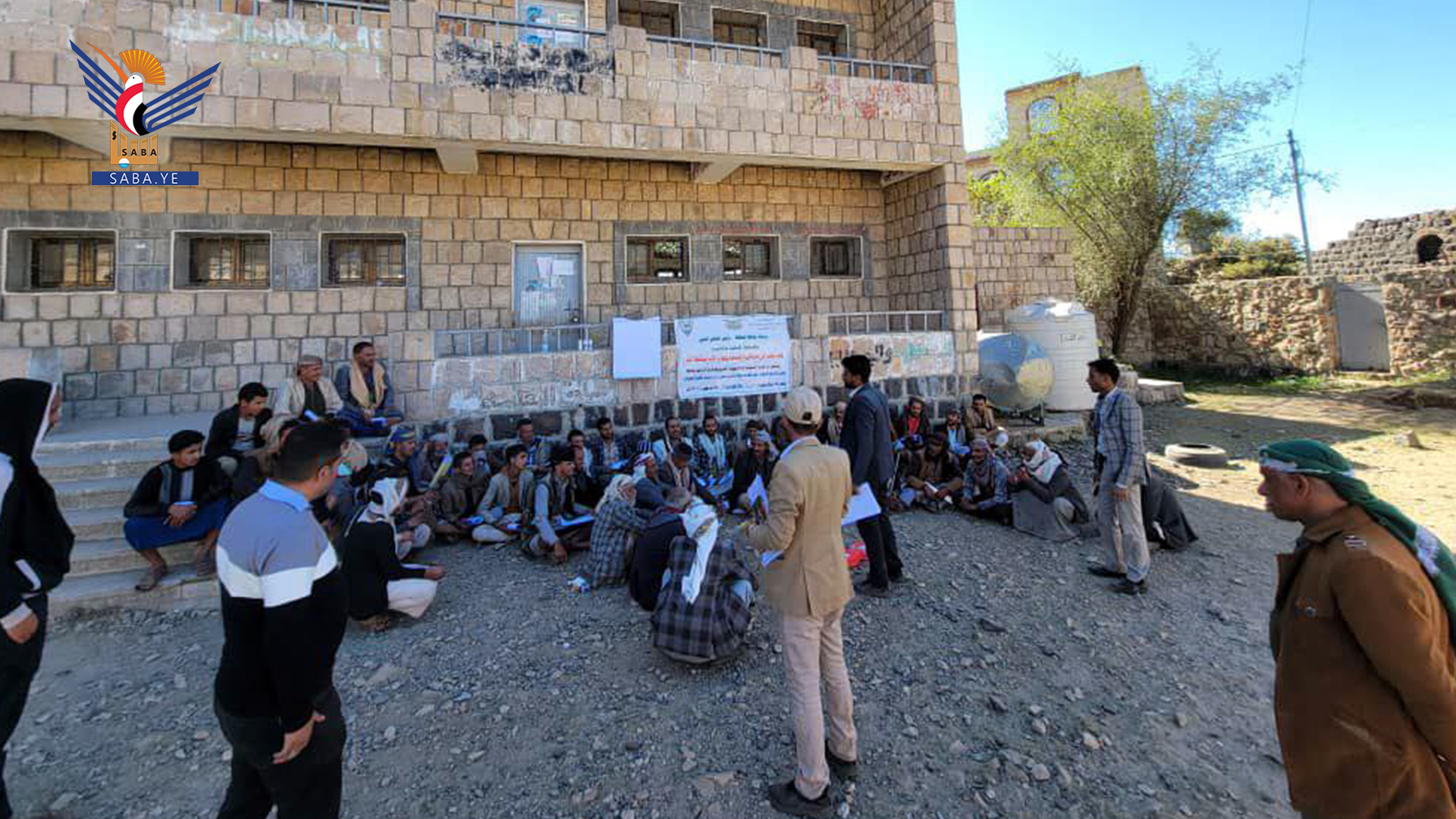
The agricultural sector in Dhamar province has carried out field training activities for 1,400 farmers from various districts, focusing on improving agricultural production in both crop cultivation and livestock management.
The training, which was carried out by Agricultural Extension specialists and development Knights in the districts over a period of 15 days, funded by the executive unit of the Department of project finance and agricultural initiatives in the province under the auspices of the Ministry of Agriculture, Fisheries and water resources, aimed to provide farmers with modern skills and experience to enhance crop and livestock productivity according to the methodology of field schools.
In Dhamar city district, farmers received field training on improving and developing the production of wheat, barley, corn, legumes, vegetables and fruits crops, and improving livestock production.
Meanwhile, 200 farmers in Wusab al-Safel district received knowledge and skills on coffee, corn, fruits and vegetables cultivation, livestock breeding, bees and honey production.
The field activities carried out at the district focused on introducing how to select seeds, updating the expertise of livestock breeders in health care services, improving shelter and feeding conditions, modern methods of beekeeping and honey production, coffee cultivation, and methods of integrated plant pest control.
The aim of the field training in a fertile area in the isolation of al-Jadalah in the district of Wusab al-Ali was to provide more than 100 trainees from coffee, corn, fruit, beekeepers and livestock farmers with a series of knowledge and guidance on the mechanisms of implementing the correct agricultural operations, correcting wrong practices in agricultural operations, the importance of selecting good seeds and methods of storage and the need to form associations and activate their role.
While more than 120 farmers from the villages of Dhi Sahar, Marsaba and Bukhran in Anes district received field skills in growing wheat, barley, corn, legumes, vegetables and fruits, and raising livestock.
The training aimed at raising awareness of the importance of expanding the production of wheat, corn and legumes, which contributes to supporting efforts and programs to promote the agricultural sector and reach self-sufficiency and enhance its role in food security.
In the same context, Maaifat Anes district witnessed field training activities aimed at training and qualifying 100 farmers, providing them with knowledge and skills about correct agricultural processes, correcting wrong practices, producing organic fertilizer, Integrated Pest Control Management and using modern irrigation methods.
The training focused on enhancing the productivity of fruit and vegetable crops, wheat, corn and legumes, solving problems related to some fruit diseases such as "fruit fly", fungal diseases affecting peach and vegetable crops, garlic diseases, and organizing the production of tomatoes and potatoes.
Meanwhile, 150 farmers from Jahran district in the villages of al-Hijrah, Bayt al-Nahmi, and al-khirbah benefited from training programs aimed at improving and developing the productivity of wheat, corn, legumes, vegetables, fruits, and livestock crops through the use of awareness of modern agricultural methods according to the methodology of field schools.
The field training aimed at motivating farmers and encouraging them to expand crop cultivation through the use of improved varieties and following the latest practices in the cultivation of wheat, barley, corn, legumes, fruits and vegetables.
In Otmah district, 145 farmers received skills and knowledge in the field of coffee, corn, vegetables and fruits cultivation, livestock and bee breeding, and skills of improving and developing production using modern agricultural methods.
The field training process also focused on aspects of enhancing productivity, methods of organic fertilizer production, dates of use, the importance of using modern irrigation methods, and ways to improve shelter and feeding conditions for livestock and prevent the slaughter of their females.
More than 100 farmers from al-Hada district received scientific knowledge and skills on enhancing agricultural production by motivating farmers to expand crop cultivation, raising livestock and raising their awareness of correct agricultural practices, how to select seeds and how to store and preserve them, establishing community seed banks and overcoming pests and diseases that affect crops.
A field training was also carried out in Doran district to qualify 100 farmers and provide them with skills about effective agricultural practices and identify the challenges facing the cultivation of grain crops and how to overcome them, and ways to improve marketing and post-harvest transactions.
100 farmers from Maghreb district received field training in the Maghreb region of Mardaa, focused on the expansion of coffee cultivation and improving its productivity, beekeeping and honey production, the importance of reclamation of agricultural lands, expansion in the cultivation of corn and fruit crops and the adoption of modern and effective agricultural practices.
The training focused on raising awareness of proper methods of seed selection, compost production, integrated management of Plant Pest Control, livestock husbandry and adherence to the Prevention of slaughter of female cows, sheep and goats.
The field schools included training activities in the district of Jabal al-Sharq, which benefited 120 farmers in Remaa Valley, during which they received knowledge and guidance on the importance of following agricultural practices according to the methodology of field schools, which includes training farmers and exchanging experiences among themselves in the fields of coffee cultivation, corn crop production, fruits and vegetables, livestock breeding, bees and honey production.
As for the Al-Manar Directorate, 149 farmers in al-Qaher and Bani al-kinai industrial areas received training activities focused on introducing beekeepers to modern methods of beekeeping, feeding, disease prevention and honey production.
The deputy director of the agriculture sector in the province Eng. Hafedh al-Junaid explained to the Yemeni news agency (Saba) that the training of farmers comes within the field schools that aim to transfer knowledge to farmers and gain them experiences and build their capabilities to make successful decisions to solve the problems they face.
He pointed out the importance of field schools and their role in forming a partnership between farmers to exchange experiences and contribute to achieving an agricultural renaissance and improving production of various agricultural crops.
Field schools are one of the training mechanisms and methods that focus on spreading awareness among farmers and introducing them to many practices and experiences in various agricultural fields in order to strengthen plans and programs to promote the agricultural sector and reach self-sufficiency.
The training, which was carried out by Agricultural Extension specialists and development Knights in the districts over a period of 15 days, funded by the executive unit of the Department of project finance and agricultural initiatives in the province under the auspices of the Ministry of Agriculture, Fisheries and water resources, aimed to provide farmers with modern skills and experience to enhance crop and livestock productivity according to the methodology of field schools.
In Dhamar city district, farmers received field training on improving and developing the production of wheat, barley, corn, legumes, vegetables and fruits crops, and improving livestock production.
Meanwhile, 200 farmers in Wusab al-Safel district received knowledge and skills on coffee, corn, fruits and vegetables cultivation, livestock breeding, bees and honey production.
The field activities carried out at the district focused on introducing how to select seeds, updating the expertise of livestock breeders in health care services, improving shelter and feeding conditions, modern methods of beekeeping and honey production, coffee cultivation, and methods of integrated plant pest control.
The aim of the field training in a fertile area in the isolation of al-Jadalah in the district of Wusab al-Ali was to provide more than 100 trainees from coffee, corn, fruit, beekeepers and livestock farmers with a series of knowledge and guidance on the mechanisms of implementing the correct agricultural operations, correcting wrong practices in agricultural operations, the importance of selecting good seeds and methods of storage and the need to form associations and activate their role.
While more than 120 farmers from the villages of Dhi Sahar, Marsaba and Bukhran in Anes district received field skills in growing wheat, barley, corn, legumes, vegetables and fruits, and raising livestock.
The training aimed at raising awareness of the importance of expanding the production of wheat, corn and legumes, which contributes to supporting efforts and programs to promote the agricultural sector and reach self-sufficiency and enhance its role in food security.
In the same context, Maaifat Anes district witnessed field training activities aimed at training and qualifying 100 farmers, providing them with knowledge and skills about correct agricultural processes, correcting wrong practices, producing organic fertilizer, Integrated Pest Control Management and using modern irrigation methods.
The training focused on enhancing the productivity of fruit and vegetable crops, wheat, corn and legumes, solving problems related to some fruit diseases such as "fruit fly", fungal diseases affecting peach and vegetable crops, garlic diseases, and organizing the production of tomatoes and potatoes.
Meanwhile, 150 farmers from Jahran district in the villages of al-Hijrah, Bayt al-Nahmi, and al-khirbah benefited from training programs aimed at improving and developing the productivity of wheat, corn, legumes, vegetables, fruits, and livestock crops through the use of awareness of modern agricultural methods according to the methodology of field schools.
The field training aimed at motivating farmers and encouraging them to expand crop cultivation through the use of improved varieties and following the latest practices in the cultivation of wheat, barley, corn, legumes, fruits and vegetables.
In Otmah district, 145 farmers received skills and knowledge in the field of coffee, corn, vegetables and fruits cultivation, livestock and bee breeding, and skills of improving and developing production using modern agricultural methods.
The field training process also focused on aspects of enhancing productivity, methods of organic fertilizer production, dates of use, the importance of using modern irrigation methods, and ways to improve shelter and feeding conditions for livestock and prevent the slaughter of their females.
More than 100 farmers from al-Hada district received scientific knowledge and skills on enhancing agricultural production by motivating farmers to expand crop cultivation, raising livestock and raising their awareness of correct agricultural practices, how to select seeds and how to store and preserve them, establishing community seed banks and overcoming pests and diseases that affect crops.
A field training was also carried out in Doran district to qualify 100 farmers and provide them with skills about effective agricultural practices and identify the challenges facing the cultivation of grain crops and how to overcome them, and ways to improve marketing and post-harvest transactions.
100 farmers from Maghreb district received field training in the Maghreb region of Mardaa, focused on the expansion of coffee cultivation and improving its productivity, beekeeping and honey production, the importance of reclamation of agricultural lands, expansion in the cultivation of corn and fruit crops and the adoption of modern and effective agricultural practices.
The training focused on raising awareness of proper methods of seed selection, compost production, integrated management of Plant Pest Control, livestock husbandry and adherence to the Prevention of slaughter of female cows, sheep and goats.
The field schools included training activities in the district of Jabal al-Sharq, which benefited 120 farmers in Remaa Valley, during which they received knowledge and guidance on the importance of following agricultural practices according to the methodology of field schools, which includes training farmers and exchanging experiences among themselves in the fields of coffee cultivation, corn crop production, fruits and vegetables, livestock breeding, bees and honey production.
As for the Al-Manar Directorate, 149 farmers in al-Qaher and Bani al-kinai industrial areas received training activities focused on introducing beekeepers to modern methods of beekeeping, feeding, disease prevention and honey production.
The deputy director of the agriculture sector in the province Eng. Hafedh al-Junaid explained to the Yemeni news agency (Saba) that the training of farmers comes within the field schools that aim to transfer knowledge to farmers and gain them experiences and build their capabilities to make successful decisions to solve the problems they face.
He pointed out the importance of field schools and their role in forming a partnership between farmers to exchange experiences and contribute to achieving an agricultural renaissance and improving production of various agricultural crops.
Field schools are one of the training mechanisms and methods that focus on spreading awareness among farmers and introducing them to many practices and experiences in various agricultural fields in order to strengthen plans and programs to promote the agricultural sector and reach self-sufficiency.
